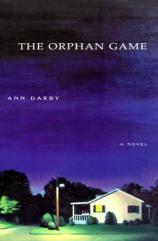Reading Group Guide
Discussion Questions
The Orphan Game

1. Sandra Scofield observed that everyone in The Orphan Game must "learn the difference between wanting and striving" and that "longing is a palpable presence" in the novel. What kinds of longings motivate Maggie? Jim? Marian? Mrs. Rumsen? Whom do you feel suffers the most trying to learn the difference between wanting and striving? Is there anyone you feel does not learn the difference?
2. How does the title illuminate the themes of the novel? Is there a character that never seems to feel orphaned in the midst of family? What are some other interpretations of the title's meaning?
3. The Orphan Game is rich with metaphors that involve driving; indeed, the turning point of the novel occurs because of a car accident. What do the driving scenes with Maggie and her father come to signify? Is there any foreshadowing of what will happen to Jamie? What does Maggie mean when she says, "My father had faith in roads, that's what I believe. He revered freeways"?
4. The narrative is told largely from Maggie's point of view, with contributions from Mrs. Rumsen, Maggie's mother, and briefly, Jamie and Allison. How does Darby distinguish their voices? What effect does the lack of narration from Jim have on the story? Maggie's voice matures considerably over the course of the novel. How does the author distinguish young Maggie's voice from the older, more experienced Maggie?
5. Mrs. Rumsen's character could be described as the happiest in the story. Do you agree? What sets her apart her from the others in the story? What do you feel is the significance of her love to dance? Though we never meet John Rumsen in the first person, how does Darby characterize him?
6. How does the setting - a quiet Southern California town in 1965 - enhance the story that is told? What about the significance of the Vietnam war being fought in the background? Is there metaphorical significance to the brush fires threatening the California foothills and the fact that Mrs. Rumsen's house is the final destination they destroy?
7. How does The Orphan Game explore, through Maggie's pregnancy, radical changes in women's sexuality, motherhood, and the nuclear family? Has Maggie's pregnancy liberated her in some ways?
8. There are a number of crucial points where Maggie's father could have changed the course of events had he acted differently. What about his character makes him so dangerous to himself and those around him? What about Maggie's mother?
9. What is Darby trying to suggest by making Jamie's death so sudden and unexpected? Why do you think Maggie intermittently speaks of her "opponent" and Jamie in the scene after his funeral?
10. Ownership is a recurring theme in The Orphan Game. In what ways do we see this theme played out? Is Maggie's mother as enthralled with ownership as her father? Is it significant that Mrs. Rumsen is the least concerned with possessions, and that the loss of them in the fire does not seem to bother her at all?
The Orphan Game
- Publication Date: August 27, 2012
- Paperback: 336 pages
- Publisher: Harper Perennial
- ISBN-10: 0688177824
- ISBN-13: 9780688177829






